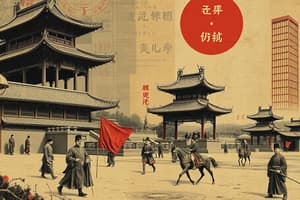Podcast
Questions and Answers
When did the Zhou Dynasty begin and end?
When did the Zhou Dynasty begin and end?
1046 BC - 256 BC
Describe the Mandate of Heaven.
Describe the Mandate of Heaven.
It was the belief that Chinese leaders had the blessing of the gods to rule and could lose this mandate if they did not govern well.
Describe the social structure of the Zhou Dynasty. How was it unique?
Describe the social structure of the Zhou Dynasty. How was it unique?
There were three social classes: aristocrats (landowners), peasants/farmers, and merchants, with merchants at the bottom.
Describe the government of the Zhou Dynasty.
Describe the government of the Zhou Dynasty.
Describe China's bureaucracy.
Describe China's bureaucracy.
How did the economy change during the Zhou Dynasty?
How did the economy change during the Zhou Dynasty?
What happened after the fall of the Zhou Dynasty?
What happened after the fall of the Zhou Dynasty?
Flashcards are hidden until you start studying
Study Notes
Zhou Dynasty Overview
- The Zhou Dynasty lasted from 1046 BC to 256 BC, marking the longest duration of any Chinese dynasty, spanning from the time of the Assyrians to the Roman Republic.
Mandate of Heaven
- The Mandate of Heaven was a key belief that rulers had divine approval to govern. Failure in leadership could result in losing this mandate, leading to the rise of a new dynasty.
Social Structure
- Society in the Zhou Dynasty was organized into three main classes:
- Aristocrats (landowners)
- Peasants/Farmers
- Merchants (the lowest class)
- Slaves were not included in this social hierarchy, highlighting the unique positioning of merchants.
Government
- Aristocrats played a crucial role in governance, owning land and managing regional affairs.
- The emperor's authority was primarily over these aristocrats, creating a delicate balance of power that could easily shift.
Bureaucracy
- The Zhou established a bureaucracy characterized by numerous officials overseeing different governmental functions.
- This system proved to be inefficient and continued to grow, remaining in place until 1911.
Economic Changes
- The introduction of currency marked a significant transition in the economy, moving away from bartering and enhancing trade.
Post-Zhou Era
- Following the fall of the Zhou Dynasty, China experienced the Warring States Period, a time of intense conflict among various families vying for control.
- This chaotic period lasted approximately 200 years and had a profound impact on Chinese history.
Studying That Suits You
Use AI to generate personalized quizzes and flashcards to suit your learning preferences.




